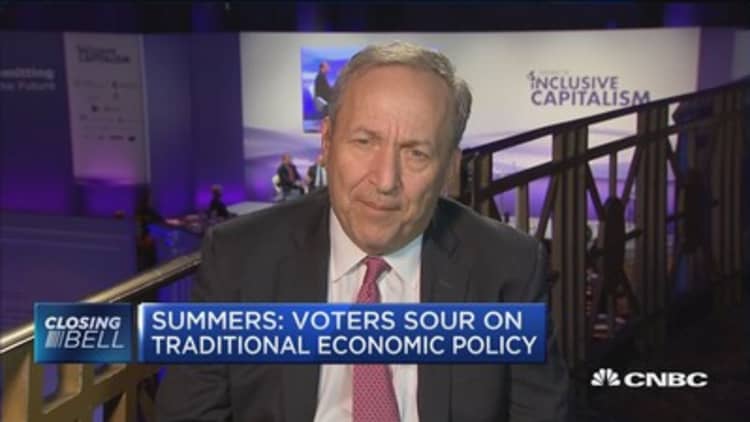"The decline in the pound is like a fever," according to former Treasury Secretary Larry Summers.
"It's a sign of some serious problems that are associated with the Brexit strategy," he told CNBC on Monday evening.

The famed American economist's comments follow a torrid start to the month for the British currency with sterling now down around 5 percent against the U.S. dollar so far in October and hovering at lows unseen since the mid-1980s.
The current level of around $1.23 per British pound is off the lows of around $1.14 seen last Friday when the currency plummeted under circumstances still under investigation by the Bank of England but widely suspected to be linked to algorithmic trading patterns.
Summers is not alone in positing that the worst may not be over as Britain inches towards the March 2017 deadline Prime Minister Theresa May has set for triggering "Article 50" and thereby the official start of the U.K.'s withdrawal from the European Union.
Julian Howard, investment director at asset manager GAM, told CNBC Tuesday he expected sterling to trade in the $1.20 - $1.25 range for the next few weeks.
Looking further out, investment bank UBS is calling for sterling to finish 2017 at $1.20 while HSBC's David Bloom sees a more brutal path ahead, with an end-2017 forecast of $1.10.
The path by which Brexit unfolds is being keenly watched by currency traders with the view that a "hard" exit from the bloc could cause further pain for sterling bulls. Yet also in focus is the path of interest rates with the Bank of England cutting as recently as August while the U.S. Federal Reserve gears up for a potential near-term rate hike, possibly as soon as December. A further divergence in rates would likely exacerbate the pressure on sterling versus its U.S. counterpart.
But despite concerns that a rapid depreciation may help to stoke inflation without growth in the U.K. and create a yet more challenging economic backdrop, it's not all bad news.
Summers also sought to highlight the winners in sterling's demise, saying "the pound will do a useful thing by stimulating British exports and encouraging some substitution from foreign producers to British producers in terms of imports."


